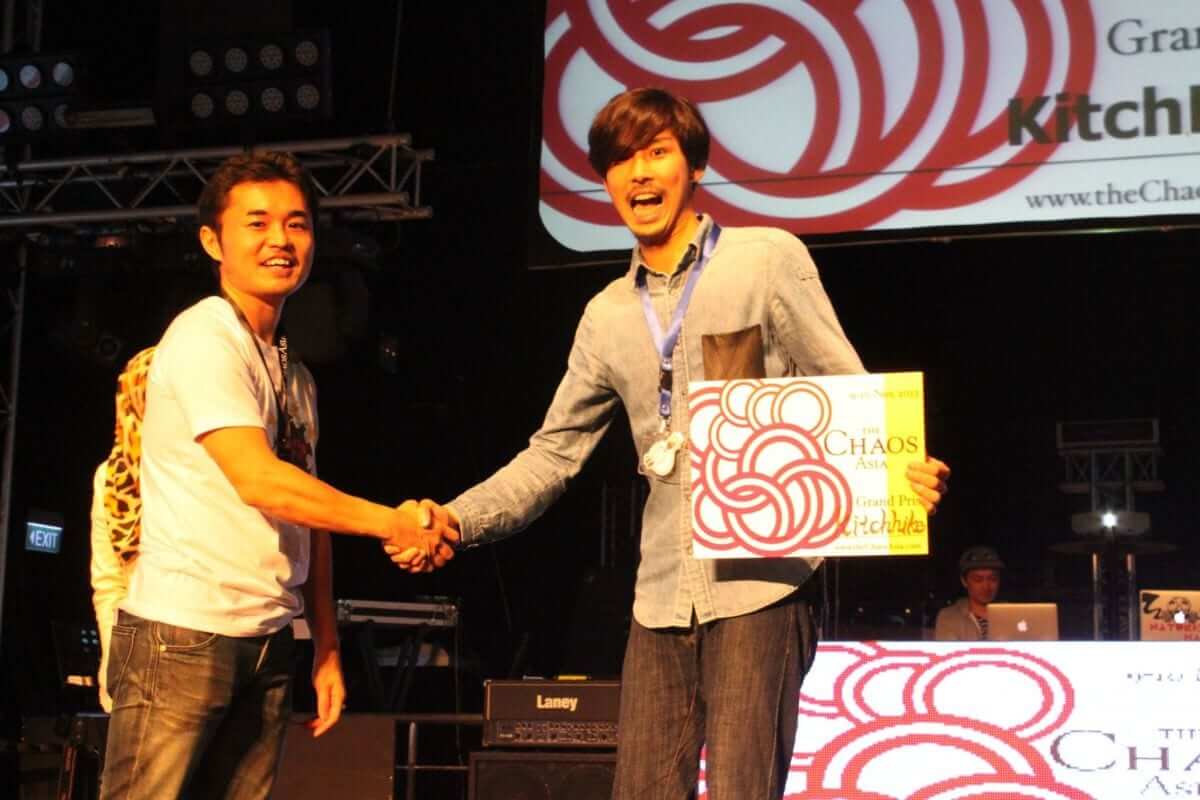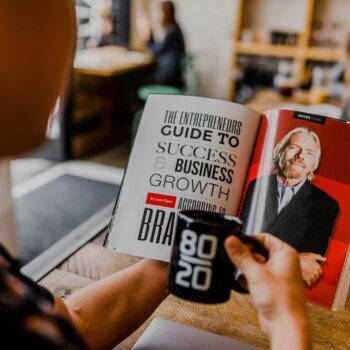Masaya Yamamoto and Yutaka “Sally” Asari, both Co-CEOs, have background in marketing and media, having spent 5 years at a Tokyo-based ad agency, Hakuhodo. Masaya, 27, has a B.A. from the School of Commerce at Waseda University in Tokyo. Sally, 29, received B.A. in Social Psychology from Hitotsubashi University – which is also in Tokyo.
The other half of the team consists of Shoken Fujisaki and Ken “Kenny” Ogino (tech engineer), both of whom have worked as engineers at System Consultancy and IT Solution firm NRI (Nomura Research Institute). Shoken, 31, has an M.A. in Economics from Tsukuba University. And Kenny, 30, also has a Masters degree from the Graduate School of Frontier Sciences at University of Tokyo. Together, they founded KitchHike, an exciting venture that The Asian Entrepreneur is examining today.
What exactly is KitchHike?
KitchHike is a web-based platform that connects COOKs (people who are interested in using their cooking skills to meet & entertain new people) and HIKERs (travelers who want to “eat local” in real people’s homes) in kitchens all over the world. In short, it is a service that lets you meet real people, and eat real food.
COOKs can list their home dishes on KitchHike.com. HIKERs can browse throgh the list of menus on the site. And the HIKER finds a COOK they’d like to visit, they can make a reservation and arrange the meet-up using the service.
We launched our service (kitchhike.com) as beta version in May 2013, and there are now registered COOKs in 14 countries where HIKERs can go to enjoy the local food.
KitchHike works as a mediator between COOKs and HIKERs, and we receive a commission charge from each transaction.
How did you come up with the idea of KitchHike?
The four of us were united by two things. Our desire to make a positive impact to the world, and our love for travelling.
We met through mutual friends, and although all of us had steady day jobs at the time, we immediately got talking about what we might do together as a startup.
We spent intensive few months discussing what we might do, and as we went deeper and deeper into discussing what we’d like to do together, there were 3 recurring themes.
1) Couldn’t we invent a new method of establishing connection and engagement between people? (Something that is deep and direct; that would help overcome the differences in nationality, culture, religion, among others.)
2) Can we provide new & alternative way for ordinary people all over the world to make money – without possessing any special skills?
3) How can we enrich “travel experience” and “daily lives” even more?
After few months, we had ourselves a very simple idea:
Match ordinary people who cook at home, and travelers who want to experience what “being local” is really like.
We immediately noticed that the idea was sort of similar to hitch-hiking. Life and travel made a little better by kindness & hospitality of strangers. But with our idea it’s going to happen in kitchens instead of cars. And that’s how we got the name; KitchHike.
Could you walk us through the process of starting up KitchHike?
After it took us about 2 or 3 months to come up with the basic concept and the name KitchHike, we immediately started working on developing the service.
When we started the development, all of us still had full-time day jobs. We found whatever time we had available during the week, and held meetings on the weekends. Some months before the beta-launch two of us left our jobs to concentrate full-time on KitchHike, and now there are three of us working full time.
Along with the four co-founders, our extended team includes art director, web designer, photographers, bloggers and other friends who helped us set up the service. We launched the service in May 2013, so it took us about 10 months to develop the site and launch it.
How has it been like managing the business since?
We have a loose base setup at a shared office / coworking space in Tokyo called PoRTAL (http://www.hituji.jp/portal/)
This is because we split our resources between further developing the service, and travelling around the world to spread KitchHike and going on KitchHiking ourselves.
We set up a date and a place to have a meet up every few months to come together as a team. The last meetup was in Singapore in November, because we were participating in the Chaos Asia 2013 (TED-style presentation competition to showcase innovative ideas from startups, NPOs, and artists).
Did you find anything particularly difficult during the startup?
There are two major difficulties. And we are still in the process of overcoming them. Firstly, there is the difficulty of funding the business. We decided early on to start the service with our own funds, but if we’re going to be serious about scaling out our operation and invest in marketing, we need external funding. While we are doing everything we can to cut our runnning cost, we are hoping to find either a really cool investor, or find some seed / angel / venture capital of some sort.
Secondly, there’s the challenge of generating as many users of our service as possible. We are constantly improving our service, like updating the website in November to make it more smartphone-friendly. And we are working on spreading our user base in Japan, Asia and beyond.
These are difficult challenge to solve. And there may not ever be a “goal” in our quest for them. But our attitude is; “What’s the point of setting up a startup if not for enjoying the stimulating challenges?”
How was the initial reaction from the consumers? Did they buy into the product/service?
We receive very enthusiastic response wherever we go to introduce our service. People seem to really dig the idea of KitchHiking. And the fact that we already have registered COOKs in 14 different countries is a proof of that enthusiastic response from the consumers.
We were also encouraged by the media coverage we received in Tokyo immediately after the beta launch (in May 2013), it generated in some really positive publicity, which helped drive our user base, and it also led to coming into contact with interesting new people.
And in November we received the grand prize at the Chaos Asia competition in Singapore. It was amazing experience to have our idea voted as the “most innovative” by thousands of fellow innovators from around Asia and beyond. (Abridged version of our presentation can seen athttps://speakerdeck.com/
So we know we have this idea that people can be excited about. The challenge for us now is to encouraging people to use our service on regular / daily basis.
Do you face a lot of competition in this industry? What is your strategy against your competition?
We are starting to see some other startups that focus on similar area – i.e. opening up people’s homes as place to “eat out.” There is no clear winner in the industry yet. And as we saw with airbnb, the battle is about establishing the user base and coming up with good user experience (and then continuously improving on them). So we think we still have a good chance to establishing ourselves. As for our strategy, we think we already have two strategic advantages.
1) KitchHike is based in Asia
One strength we have is that we are based in Asia, as it puts us in a strong position to spread our user base around the region. Needless to say, Asia is a popular destination for young travelers / backpackers who are eager to have travel experiences that are as “local” and “genuine” as possible.
2) KitchHike focuses on “ordinary people” (and not professionals)
While other competitors are focusing more on “semi-professional” home cooks who can cook like a pro, our philosophy from the start has been to provide a place for ordinary home cooks to make a bit of money from their daily cooking.
And we consider this an advantage because it means anyone who cooks at home can become a “COOK” with KitchHike, therefore giving us a larger pool of potential user base. And by listing ordinary people’s homes as potential place to visit, it makes the service that much more interesting. With KitchHike, we hope to provide a brand new method – a positive excuse – to spice up our daily lives; for both COOKs (ordinary home cooks who want to meet new people) and HIKERs (travelers who want to experience what “being local” is really like.)
What can you tell us about the industry? Have you developed any industry insights that you could share?
As we are a startup trying to spread a new lifestyle habit, it is difficult to talk about “the industry” or “industry insights.”
However, through my recent experience as a practicing “KitchHiker” myself, I find that everytime we KitchHike it is always such a life-enriching experience.
We spend only a few hours of our lives together, but something about sitting down to eat inside people’s homes really helps to establish a deep connection and exchange our lives in such short time. The experience changes me (the HIKER) but to have this strange traveler come into your home to share your food, it changes them (the COOKs) too.
How have you managed to stay relevant in this industry?
As I mentioned earlier, we have been fortunate to receive enthusiastic support from various media outlets.
We now have regular columns at Newsweek and Brutus (a long-runnnig lifestyle magazine in Japan) where we report our latest experiences of “KitchHiking.” We also have good rapport with web media covering tech / startups such as Lifehacker (lifehacker.jp) and THE BRDIGE (formarly known as StartupDating and Sd Japan) who have supported us from the start with their positive and enthusiastic coverage.
We have the advantage that KitchHike generates interest from anyone interested in “food” “travel” and “web / startup” – which is a good and somewhat unusual mix, and it covers quite a broad field of interest.
What are your future plans for KitchHike?
We are a web-based startup, so (unlike ordinary businesses) it’s important to be careful not to establish “plans” that are too rigid, and be open to pivots in deictions and iterating our user experience and business models that works best.
Having said that, our current plan is to establish a good user base (both COOKs and HIKERs) and have them enjoy the “KitchHike” experience first hand.
In the long term, our vision is to transform kitchens in ordinary homes into places for cultural exchange. And establishing KitchHiking as a way for ordinary people (COOKs) to make some money, and also to have a chance to connect to the broader world by sitting down to eat with people that have different backgrounds.
What do you think about startups in Asia?
I think Asia is a fantastic region for starups. There’s good balance between established financial centers such as Sigapore or Tokyo, and energetic up & coming cities that are transforming by the day. Obviously the population is young and growing, and the economic growth in the region will make young people more affluent, which is bound to help new businesses that answers their needs.
I have also been encouraged by the powerful young entrepreneurs and innovators I have met through my recent experiences of traveling around the region.
There are some difficulties, such as the scale of investment not being as large at it is in US, but I think that situation is bound to improve with time.
What are some personal principles or personal values that guide you and your career?
To anticipate the future. In other words, to see in advance what would be the norm in the future world.
In order to do that, it’s important to learn from history, and be alert & perceptive towards what is happening right now.
I believe that there are always seeds for the future lying about, waiting to be noticed. And those seeds have roots in what has happened in the past. When you find that linkage between past-present-future, you can see & understand what is bound to happen and make a move in advance.
Why did you decide to become an entrepreneur?
I never set out to be an entrepreneur.
I’m just a guy who wants to make a positive impact in the world – to change and enrich it. And in this day and age, the most obvious approach for doing that seemed to be to use the power of the web, and to start a startup.
If I belonged to a different generation, I think that I probably would never considered starting up a business. Maybe I might have tried writing novels, or got involved in politics, or work the field as a farmer, or whatever.
In your opinion, what are the keys to entrepreneurial success?
1) Flexibility
2) Bravery to be in the minority
3) Credibility
Flexibility, because you need to read the tides of time and to proactively adapt yourself to it. Not being afraid to change the initial plan. To always be moving forward in the direction you can; because that is where the real need is.
Bravery to be in the minority. New & novel ideas will not be accepted and understood at first. But you need have faith that future is on your side, and what is minority now will be the norm in the future, and make brave steps towards that future.
Credibility. You won’t succeed without help and kindness from people around you. It helps enormously to have people who believe in you and to willingly support you. And to do that you need to open yourself up and be credited for the person you are.
Any parting words of wisdom for entrepreneurs out there?
William Gibson said “The future is already here.”
I think when you search for entrepreneurship ideas, some people tend to fall into the trap of serching for the “Big Idea” – feeling that they need to invent something that is totally revolutional and totally new.
But that’s not necessary at all. So many successful startups are about solving the small problems and inconviniences that have existed for so long, and to simply provide a solution that is accessible and easy to use. Look at Uber or Airbnb. In the US, “Carpooling” has been a popular & practical option in cities that have limited method of transport, and Americans have long rented the spare rooms that their grown kids have left behind. In other words, the future was already there, and right there in the hands of the ordinary people.
What Uber and Airbnb did was to simply notice those scenes from life, and to repackage it in the way that fits the current lifestyle, in the style of user-friendly infrastructure.
I think the word “entrepreneur” tend to imply charismatic genius with crazy idea, but in actuality I think it helps more to be alert & perceptive to what’s happening (and what needs to happen) here and now.
Connect
Facebook: www.facebook.com/Kitchhike
Twitter: www.twitter.com/Kitchhike
Blog: www.blog.kitchhike.com
































